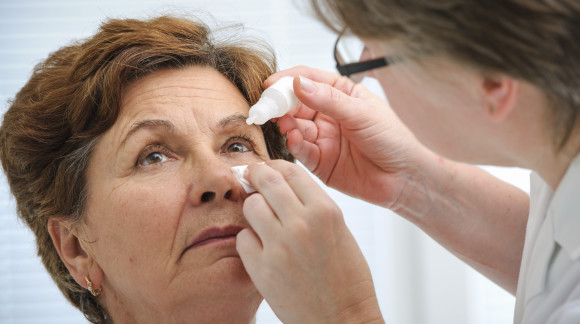Treatments for Dry Eye

Identifying Dry Eye Causes
Problems with your eyesight can be among the peskiest of health issues. If you can’t see, or if your eyes are causing discomfort or pain, it can significantly hinder daily functioning. You need your vision to perform the most basic of tasks.
If your eyes are dry you will likely immediately know something is wrong. You may experience:
- Stinging, burning, scratchy (rough) sensation when you blink
- Sensitivity to light
- Redness
- Blurred vision
- Mucus on or just around the eye
Dry eyes occur when your body cannot create enough lubrication. Dry eyes create an uncomfortable sensation but do not necessarily indicate something is medically wrong. Keratoconjunctivitis is a condition defined as a lack of tear production. Your tears are made of water, oils and mucus with the purpose of clearing your eyes to prevent infection. When the tears cannot be created your eyes become more sensitive to the elements.
Your eyes can decrease tear production because of age, recent eye surgery, hormones, new medications and/or tear gland damage. An imbalance in tear composition can also be the reason for your dry eye symptoms. Elements like wind, smoke and dry air can also contribute to uncomfortable dry eyes. When working on tasks that require visual concentration you might blink less, which can also contribute to drying your eyes out?
Medicines for Dry Eye Relief
Many over the counter (OTC) products are available to relieve dry eyes. When navigating the shelves keep these tips in mind:
- Preservatives in drops prolong the shelf life but they can also make your eye irritation worse. Don’t use eye drops with preservatives more than four times a day.
- Eye ointments are different than eyes drops and are best used right before bed since they are thick and often cause cloudy vision.
- Drops that reduce redness will not likely help your quest to solve your dry eye symptoms. In fact, prolonged use can cause further irritation.
- Buy when possible signal dose products to prevent any infections. Single dose products will have 20 to 30 or more doses prepackage.
Natural Remedies for Dry Eyes
When possible, natural remedies for your health concerns are the safest solution. They are also often the cheapest and sometimes work faster than OTC products.
For natural relief for dry eyes, try the following:
- Wear sunglasses when outside to protect your eyes from the sun and any dirt or particles in the air.
- Lightly clean your eyelids with your daily face wash.
- Apply a warm towel to your eyes to help unblock tear glands.
- Remove your contact lenses for 24 hours.
- Visit your local acupuncturist and explain your symptoms.
- Supplement your diet with fatty acids like walnuts, chia seeds and flaxseed.
- Change your environment. Fresh cut grass, highly air conditioned buildings, long drives in a car with the air on, sleeping with a fan over the bed, and wind can aggravate dry eyes.
When a Visit to the Doctor is Necessary
As always, consult a medical professional if you experience symptoms for an extended period of time. In extreme cases, ophthalmologists can prescribe stronger medication or advancements in eye surgery, to alleviate dry eye pain.
Your eyesight is, arguably, your most valuable sense. Listen to your eyes and take action against dry eyes to prevent further damage.
Additional Resources
- Dry Eye Treatment, by theralife.com
- What is Dry Eye, by whatisdryeye.com
- Who Gets Chronic Dry Eye and Why, by mydryeyes.com
- Causes of Dry Eye, by mayoclinic.org
- A Complete Guide for Dry Eye Syndrome, by Dr. Stephen Thompson
- Facts about Dry Eye, by National Eye Institute
- 9 highly Effective Solutions for Dry Eyes, by prevention.com
- 6 Effective Dry-Eye Treatments, by foxnews.com
- Intense, Pulsed Light for Dry Eye Syndrome, by Rolando Toyos, MD
- Patient Education Sheet, by Sjogren’s Syndrome Foundation
Videos
- Dry Eye Educational Video, by AllThingsEyes
- Dealing with Dry Eyes, by abcnews.go.com
- Dry Eye Information, by Glaucoma Research Foundation
- Dry Eyes, by Roper St. Francis
- Treating Dry Eye Disease with Diet: Just Add Water, by NutritionFacts.org
- Dry Eye treatment with Light Therapy using IPL, by chelseaeye
Education
- Is it Dry Eye, Allergy or Both, by reviewofoptomerty.com
- Patient Education Information and Handouts, by va.gov/OPTOMETRY
Books
- Dry Eye Treatment, by Daniel Anderson
- The Dry Eye Remedy, by Robert Latkany
- Healing Your Eyes with Chinese Medicine, by Andy Rosenfarb and Marc Grossman
- Natural Eye Care: An Encyclopedia, by Marc Grossman and Glen Swartwout
Apps
- Dry Eyes, by TRC, LLC, available on google play for a fee
- Dry Eye, by slideshare.net, available on iTunes for a fee
- Dry Eye Syndrome, by Google Play, Free
